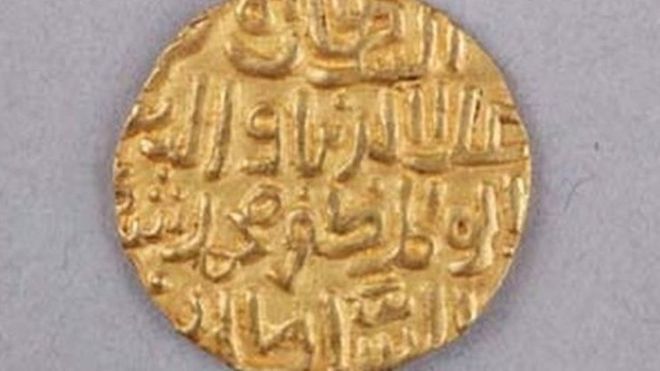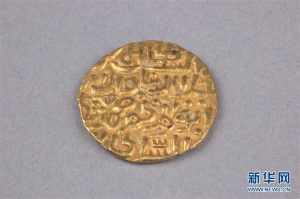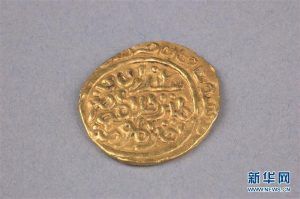
A Chinese museum is offering a reward to anyone who can decode the inscriptions written on six gold coins found in China’s Hunan province.
The coins which are hundreds of years old were first unearthed on a farm in the 1960s, where they had been kept inside a small glazed pot.
The BBC reports:

BYPASS THE CENSORS
Sign up to get unfiltered news delivered straight to your inbox.
You can unsubscribe any time. By subscribing you agree to our Terms of Use
They arrived at Jinshi City’s museum in the 1980s, and archaeologists have been puzzling over their markings ever since, the Xinhua news agency reports. Now the museum says it’ll hand out 10,000 yuan ($1,500; £1,100) to anyone who can help to shed light on the meaning of the coins’ etchings.
The director of the city’s Cultural Relics Bureau says they were manufactured in the Delhi Sultanate, the main Muslim sultanate in northern India, around the late 13th Century during China’s Yuan dynasty. The front of the coins bears the name of a king, written in a rare form of Arabic, Peng Jia tells the China News Service. “But the information on the back is difficult to decode. I have consulted Chinese and foreign experts, but to no avail.”

The coins have been designated as “first-grade national cultural relics”, meaning they are officially considered national treasures in China.
Edmondo Burr
CEO
Assistant Editor
Latest posts by Edmondo Burr (see all)
- Police Arrest Suspect In Supermarket Baby Food Poisoning - October 1, 2017
- Seoul Secures Data From Electromagnetic Interference By N Korea - September 30, 2017
- The ‘World’s First Internet War’ Has Begun: Julian Assange - September 30, 2017


The Inscription is more like Arabic, as i can see Muhammad written in Arabic
The Inscription is more like Arabic, as i can see Muhammad written in Arabic
INDIAN COINS, SULTANATES, SULTANS OF DEHLI ‘Ala’ al-Din Muhammad,Gold Tanka, Hadrat Dehli, AH 705, sikandar al-thani legend and single border, 11.00g
Umayyad warriors had penetrated into Sindh as early as the beginning of the 8th century, but the Muslim presence in India did not make a decisive impact until the arrival of the Ghaznavids and the Ghurids in the 11th and 12th century. The Ghurids’ conquests in northern India laid the basis in around 1200 for the first of a number of Muslim sultanates, often headed by princes of Turkic origin. The Indian sultanates survived until they were swallowed up in the 16th and 17th century by a new, expansive Islamic power in India, the Mughal Empire.
The Delhi Sultanate emerged when one of the Ghurid commanders, Qutb al-Din Aybak, established an independent realm in northern India, with Delhi as its capital. The Delhi Sultanate, which soon reached from Sindh in the west to Bengal in the east, barely repulsed the Mongol invasion in 1241. The influx of Muslims from Iran and Central Asia fleeing the Mongols brought with it both cultural influences and a decisive increase in the Muslim population, since most of the subjects of the realm had been Hindus. The Delhi Sultanate continued its expansion south under the Khalji dynasty (1290-1320), and Muslim dominance on the Indian subcontinent reached its greatest geographical extent under the Tughluqids (1320-1414). After several large-scale campaigns, they ruled all of India for a short period, with the exception of a few Hindu enclaves in the north and south. Despite an attempt to move the capital to Daulatabad in central India, it soon proved impossible to rule the great empire. Several governors declared their independence, and Timur’s invasion and plundering of Delhi in 1398-1399 marked the beginning of the end of the Tughluqid realm, which was soon dissolved into a drastically reduced Delhi Sultanate and many minor Muslim states.
The Delhi Sultanate’s rulers clearly demonstrated with great buildings with domes, minarets, and special Islamic forms of decoration that Islam had come to India. Hindu motifs and more naturalistic depictions nonetheless influenced Islamic art at an early stage.
One of the Tughluqid commanders had founded an independent realm in the Deccan in 1347. The Bahmanid Sultanate was split up from the end of the 15th century into many smaller states, after which the courts in Bijapur, Golconda, Ahmadnagar, Bidar, and Berar developed into artistic centers that were famous among other things for the production of exquisite metalwork and paintings. Persian culture played an important role there, since several of these sultanates were Shiite and maintained close ties to Safavid Iran. In 1687, Golconda was the last of the Deccan Sultanates to be swallowed up by the Mughal Empire.
INDIAN COINS, SULTANATES, SULTANS OF DEHLI ‘Ala’ al-Din Muhammad,Gold Tanka, Hadrat Dehli, (1296-1316 AD) sikandar al-thani legend and single border, 11.00g, 10.8-11gr, and 10.9-11grm
Obverse: al-sultan al-a’zam ‘ala al-dunya wa’l din abu’l muzaffar muhammad shah al-sultan. Reverse: sikandar al-thani yamin al-khilafa nasir amir al-mu’minin. date and mint-name around. OR (starting at 12 o’clock, from right to left): “Zarb Hazihi Al-Fizzat Bi-Hazrat Dehli Fi Sanat (date)”
Umayyad warriors had penetrated into Sindh as early as the beginning of the 8th century, but the Muslim presence in India did not make a decisive impact until the arrival of the Ghaznavids and the Ghurids in the 11th and 12th century. The Ghurids’ conquests in northern India laid the basis in around 1200 for the first of a number of Muslim sultanates, often headed by princes of Turkic origin. The Indian sultanates survived until they were swallowed up in the 16th and 17th century by a new, expansive Islamic power in India, the Mughal Empire.
The Delhi Sultanate emerged when one of the Ghurid commanders, Qutb al-Din Aybak, established an independent realm in northern India, with Delhi as its capital. The Delhi Sultanate, which soon reached from Sindh in the west to Bengal in the east, barely repulsed the Mongol invasion in 1241. The influx of Muslims from Iran and Central Asia fleeing the Mongols brought with it both cultural influences and a decisive increase in the Muslim population, since most of the subjects of the realm had been Hindus. The Delhi Sultanate continued its expansion south under the Khalji dynasty (1290-1320), and Muslim dominance on the Indian subcontinent reached its greatest geographical extent under the Tughluqids (1320-1414). After several large-scale campaigns, they ruled all of India for a short period, with the exception of a few Hindu enclaves in the north and south. Despite an attempt to move the capital to Daulatabad in central India, it soon proved impossible to rule the great empire. Several governors declared their independence, and Timur’s invasion and plundering of Delhi in 1398-1399 marked the beginning of the end of the Tughluqid realm, which was soon dissolved into a drastically reduced Delhi Sultanate and many minor Muslim states.
The Delhi Sultanate’s rulers clearly demonstrated with great buildings with domes, minarets, and special Islamic forms of decoration that Islam had come to India. Hindu motifs and more naturalistic depictions nonetheless influenced Islamic art at an early stage.
One of the Tughluqid commanders had founded an independent realm in the Deccan in 1347. The Bahmanid Sultanate was split up from the end of the 15th century into many smaller states, after which the courts in Bijapur, Golconda, Ahmadnagar, Bidar, and Berar developed into artistic centers that were famous among other things for the production of exquisite metalwork and paintings. Persian culture played an important role there, since several of these sultanates were Shiite and maintained close ties to Safavid Iran. In 1687, Golconda was the last of the Deccan Sultanates to be swallowed up by the Mughal Empire.